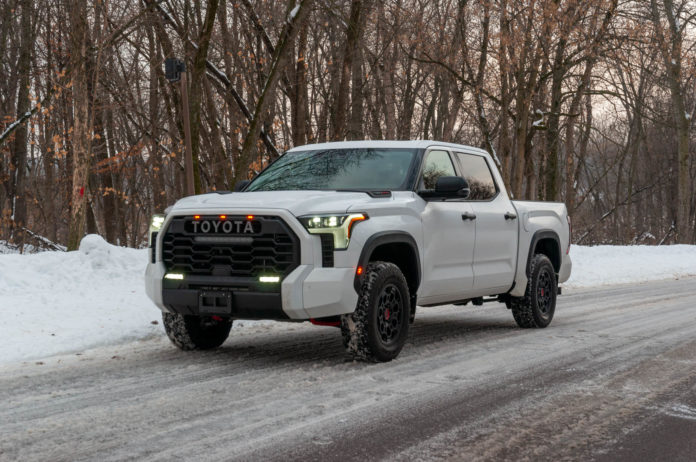When photos of the redesigned Toyota Tundra TRD Pro leaked I wondered for a split-second if the Japanese automaker had created a Ford F-150 Raptor competitor.
It didn’t.
Once full details were released, it became clear that the 2023 Toyota Tundra TRD Pro is still an off-road trim level without the extreme off-road capability of a Raptor. It also now gets slapped-on bits that feel like they came from the aftermarket.
Here are the pros and cons of the 2023 Toyota Tundra TRD Pro after spending a week driving around in a blizzard, hauling the family to the ski hill, and running errands around town.
2023 Toyota Tundra TRD Pro
Pro: Tundra’s TRD Pro’s exhaust growls
It’s hard to believe there’s a 3.5-liter twin-turbo V-6 under the hood. A surprisingly deep, guttural burble emits from the TRD exhaust system upon cold start that sounds like it’s just one octave higher than a V-8. The exhaust note quiets down after a few seconds, but still sounds deep and rich. If you listen closely while driving, it’s pretty easy to hear the turbos spool up and then blow off as you dip into the throttle and let off. I dig it.
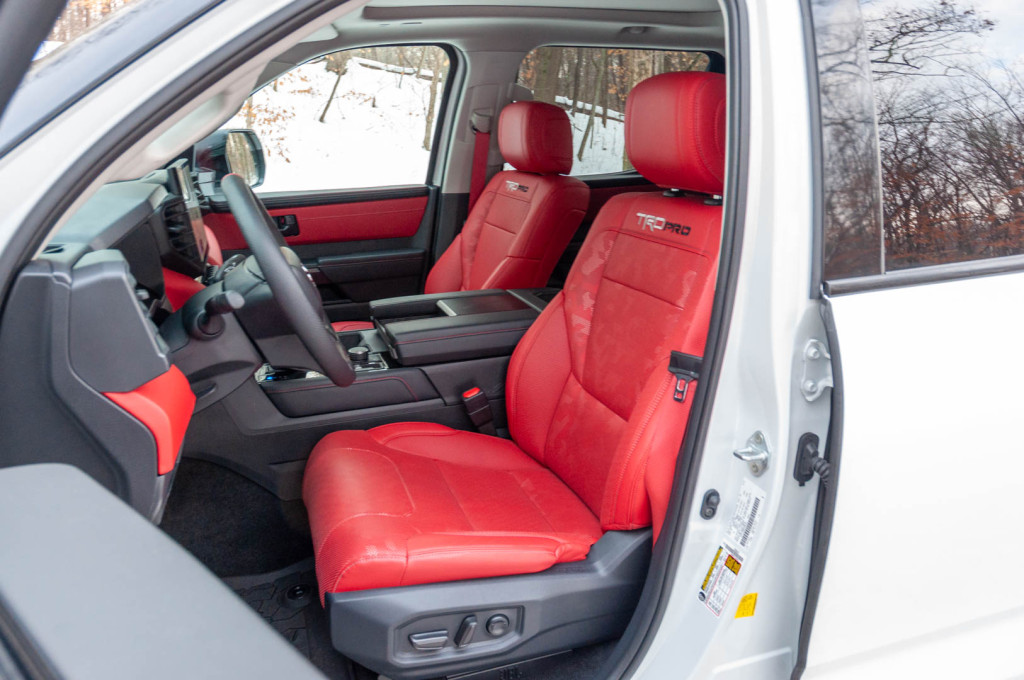
2023 Toyota Tundra TRD Pro
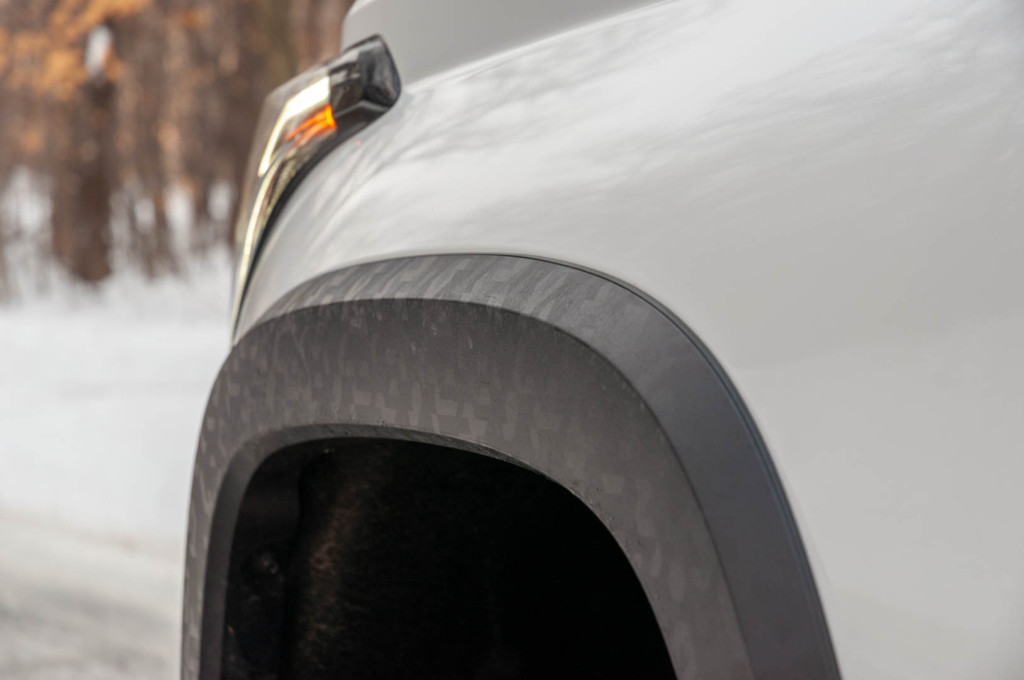
2023 Toyota Tundra TRD Pro
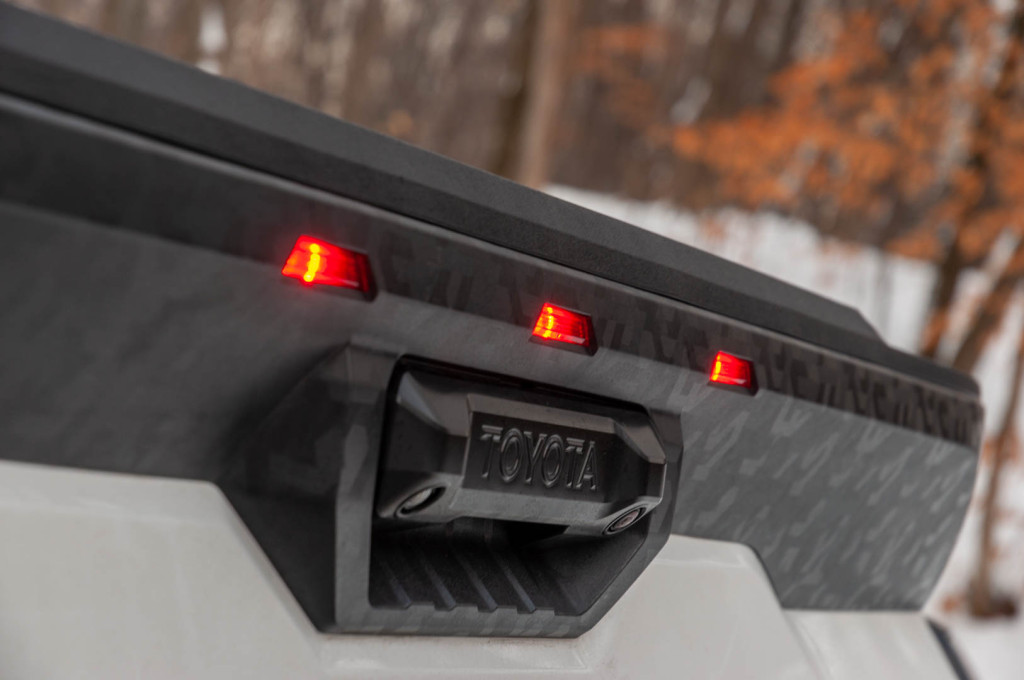
2023 Toyota Tundra TRD Pro
Con: Camo comes standard inside and out on Tundra TRD Pro
If you don’t want camo bits on your truck, the Tundra TRD Pro isn’t for you. Camo adorns the fender flares, front and rear bumper trim, and tailgate trim, and it all looks like it came from a JC Whitney or Rough Country aftermarket parts catalog. The fender flares make the Tundra about an inch wider than other trims and necessitate the amber running lights because the truck’s just over 80 inches wide. Inside, buyers have the choice of a red or black interior, but either way the seat bottoms and backs are covered in a camouflage pattern. A for effort, but F for execution. It comes off as tacky. The extra visual pop of the red interior option makes it worse.
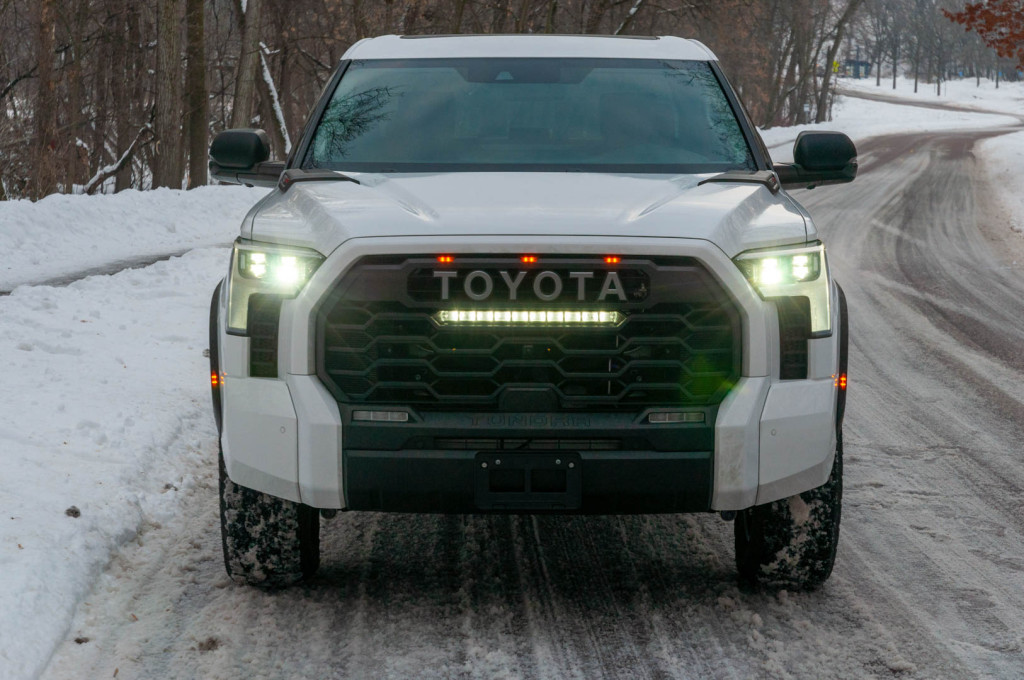
2023 Toyota Tundra TRD Pro
Pro and Con: Tundra TRD Pro comes with factory-integrated light bar
This seems like a good idea in concept, but in reality it’s somewhat poorly executed. Extra light output is meant to increase how far you can see down the road and therefore improve reaction times. This grille-mounted driving light doesn’t do that. At 3,000 lumens, the TRD Pro’s light bar is about as bright as a $30 hand-held flashlight. At night, I could detect no additional light down the road when using the low beams, and it added only a smidge of light to the sides of the road. Toyota allows the light bar to be turned on with the low beams and when the high beams are off in their auto mode. It’s mostly for show.
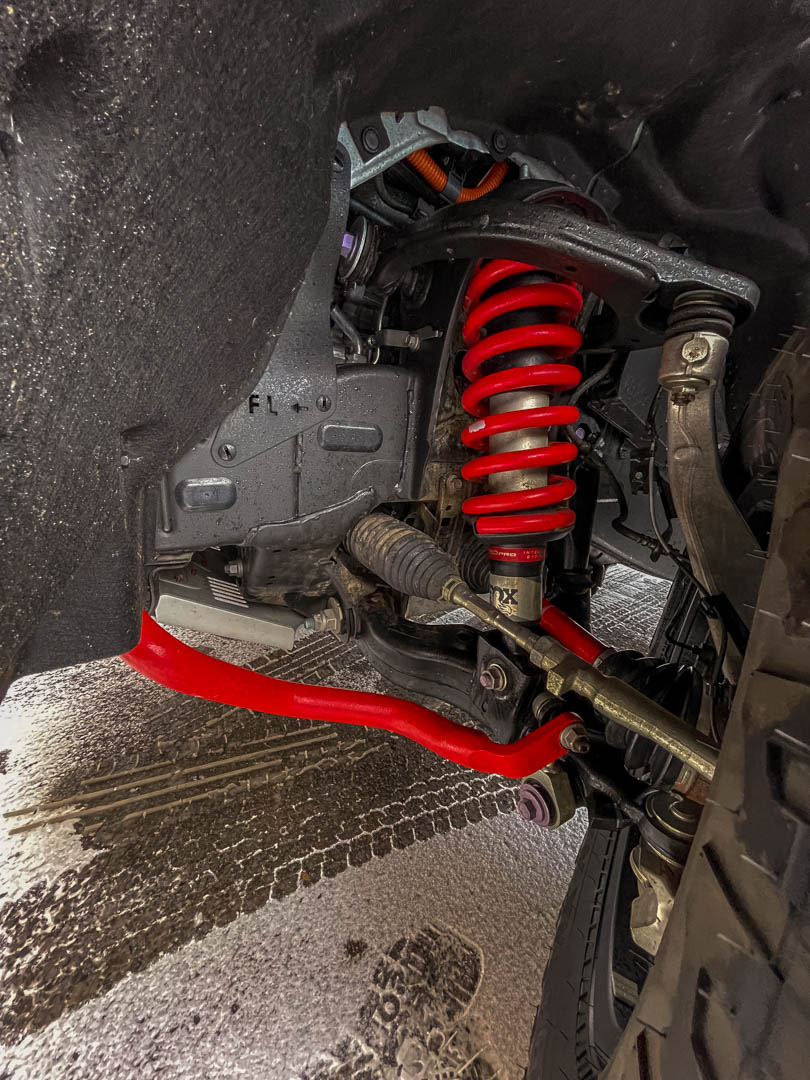
2023 Toyota Tundra TRD Pro
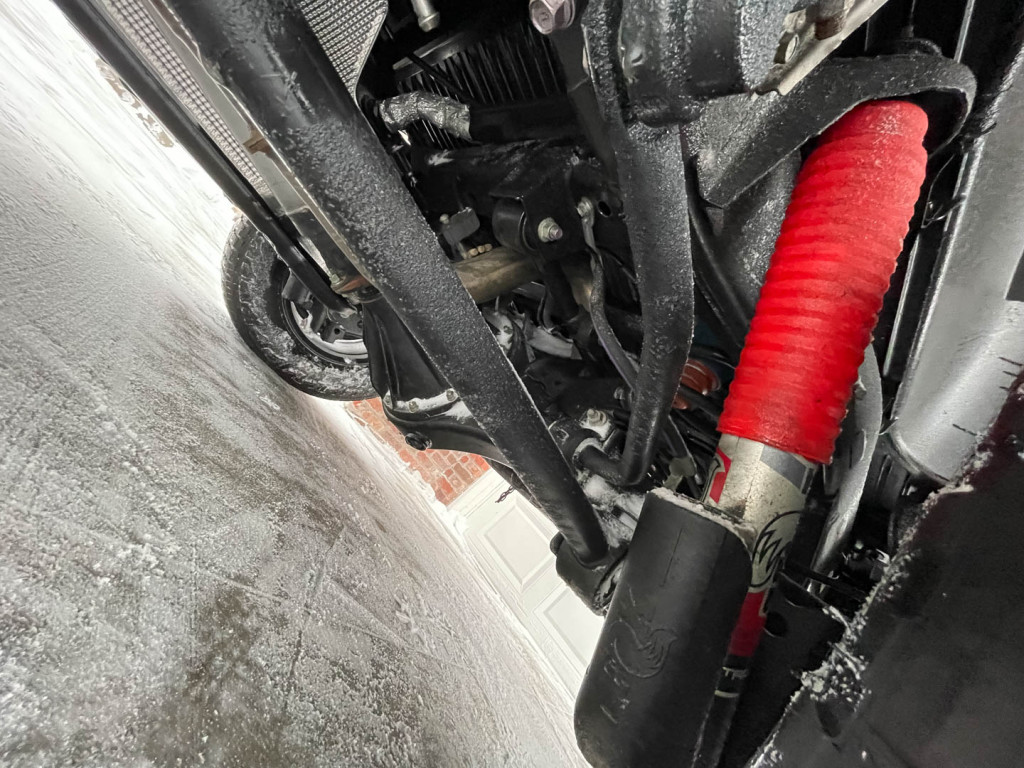
2023 Toyota Tundra TRD Pro
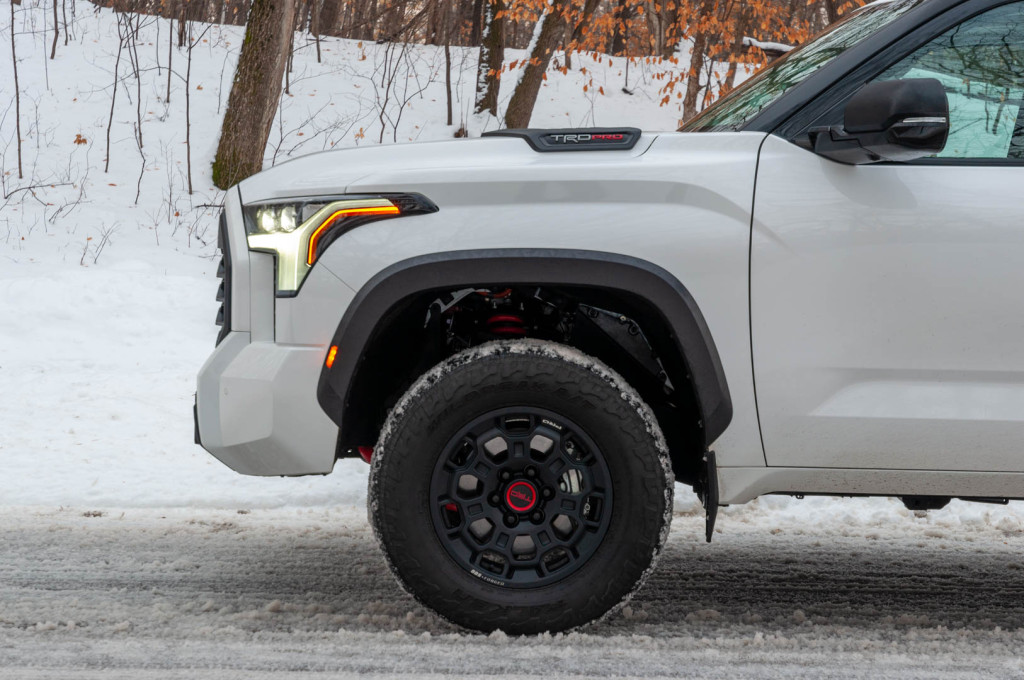
2023 Toyota Tundra TRD Pro
Pro and Con: The Tundra TRD Pro is set up for larger tires
To improve off-road capability, the Tundra TRD Pro rolls on 33-inch Falken Wildpeak 3 all-terrain tires. It also sports 2.5-inch Fox Racing remote-reservoir shocks, a larger TRD front sway bar, TRD front springs, and BBS forged 17-inch wheels. The sway bar and springs are painted red, which is neat, I guess. The truck rides too firmly, and it bounces over Midwest potholes and broken pavement. It’s not soft and cushy like a F-150 Tremor. As Wes Siler from Outside pointed out, this setup drives as if it’s meant to accommodate 35s straight from the showroom with the correct turning radius and no tire scrubbing while managing the extra weight of the larger tires. Putting 35s on the Tundra TRD Pro would likely settle the ride and fix some of the harsh impacts that you wouldn’t expect in an off-road-focused truck. A factory 2.0-inch lift kit from Toyota would also likely allow 37s to fit comfortably.
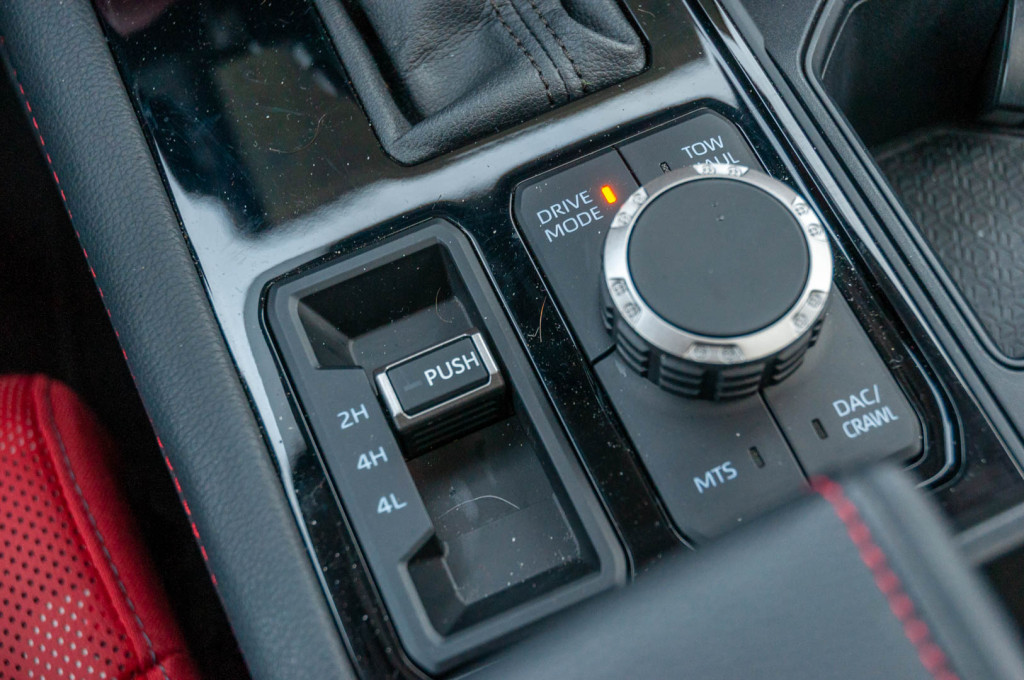
2023 Toyota Tundra TRD Pro
Con: No full-time four-wheel drive
Every four-wheel-drive Tundra has a part-time system. Yes, including the TRD Pro. No full-time four-wheel-drive system is available like on basic road-oriented Ram 1500s, Chevrolet Silverados, GMC Sierras, and Ford F-150s, not to mention the off-road variants. At least the TRD Pro features a rear locking differential.
Con: Too expensive
Off-road trucks aren’t cheap. But the Tundra TRD Pro as tested cost $71,475, which is about $2,000 less than a Chevrolet Silverado ZR2 and $7,000 less than a Ford F-150 Raptor. But it’s about $9,000 more than a base Ford F-150 Tremor, which has full-time four-wheel drive. Add a Torsen limited-slip differential to the Tremor, load up the options so the Toyota and Tremor are apples-to-apples, and they nearly cost the same price with the Tremor featuring better off-road hardware and software. A Silverado ZR2 is far more capable off-road for a few grand more, and this Tundra isn’t even in the same class in terms of capability or power as the F-150 Raptor.
The 2023 Toyota Tundra Pro appeals on the surface. It looks tough and brawny and has enhanced off-road capability. However, like the Tundra Capstone, the Tundra TRD Pro feels like it’s playing following the leader with a bunch of stuff added to make it look cool. It comes off as a half-hearted effort. At least larger tires would both look cool and improve the ride quality.
––––––––––––––––––––––––––––––––––––––––––
2023 Toyota Tundra TRD Pro
Base price: $71,215, including destination
Price as tested: $71,475
Powertrain: 437-hp twin-turbo V-6 hybrid, 10-speed automatic, part-time four-wheel drive
EPA fuel economy: 18/20/19 mpg
The hits: Sounds good, factory-integrated light bar concept, ready for larger tires
The misses: Cringey camo trim, lacks full-time four-wheel drive, suspension tuning with 33s, lightbar execution

